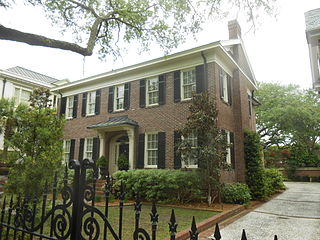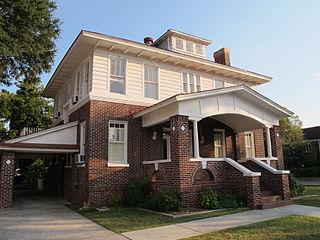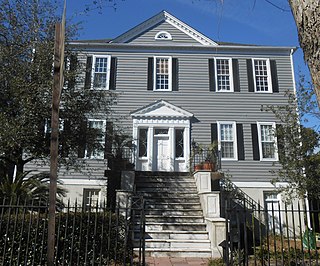Related Research Articles

Joseph Patrick Riley Jr. is an American politician who was the Mayor of Charleston, South Carolina. He was one of the longest serving mayors in the United States that is still living, having served 10 terms starting on December 15, 1975, and ending on January 11, 2016.

Burnet Rhett Maybank was a US senator, the 99th governor of South Carolina, and mayor of Charleston, South Carolina. He was the first governor from Charleston since the Civil War and one of only twenty people in United States history to have been elected mayor, governor, and United States senator. During his tenure in the Senate, Maybank was a powerful ally of President Franklin D. Roosevelt. His unexpected death on September 1, 1954, from a heart attack, led to Strom Thurmond being elected senator.
Thomas Roper may refer to:

Tristram Tupper Hyde was the mayor of Charleston, South Carolina, from 1915 to 1919.
John Palmer Gaillard Jr. was an America politician, who was Mayor of Charleston, South Carolina from 1959 to 1975. The Gaillard Center is named after him. During his tenure, Gaillard significantly expanded the size of Charleston by annexing nearby neighborhoods.

William McG. Morrison was the fifty-seventh mayor of Charleston, South Carolina, serving between two terms between 1947 and 1959. He was the first person elected to three terms as mayor of Charleston as a result of his win in June 1955. He lost his fourth bid by 455 votes to J. Palmer Gaillard, Jr. on June 9, 1959.

Henry Whilden Lockwood was the fifty-fifth mayor of Charleston, South Carolina, serving between 1938 and 1944.

Thomas Porcher Stoney was the fifty-third mayor of Charleston, South Carolina, serving between 1923 and 1931.
Arthur Bonnell Schirmer Jr. was the fifty-ninth mayor of Charleston, South Carolina, completing the final four months of J. Palmer Gaillard, after Gaillard's resignation. He did not run for election for a full term.
E. Edward Wehman Jr. was the fifty-sixth mayor of Charleston, South Carolina, completing the term of Henry Whilden Lockwood and not running for reelection. He was born on December 27, 1891, in Charleston, South Carolina to E.E. and Bertha T. Wehman. He attended West Point in 1911 and 1912 and received a bachelor of science degree from the University of South Carolina. When Dwight D. Eisenhower, a classmate of Wehman's at West Point, was elected president, Wehman served as one of the eight electors from South Carolina.
John P. Grace was the fifty-first mayor of Charleston, South Carolina, completing two, nonconsecutive terms from 1911 to 1915 and then 1919 to 1923.

Robert Goodwyn Rhett (1862–1939) was the fiftieth mayor of Charleston, South Carolina, completing two terms from 1903 to 1911. From 1916–1918, he served as president of the Chamber of Commerce of the United States.

George D. Bryan (1845–1919) was the forty-seventh mayor of Charleston, South Carolina, completing one term from 1887 to 1891. Bryan was born on September 26, 1845, in Charleston to United States judge George S. and Rebecca Louisa Dwight. He died on June 4, 1919, and is buried at Magnolia Cemetery in Charleston.

John Frederick Ficken Jr. (1843-1925) was the forty-eighth mayor of Charleston, South Carolina, completing one term from 1891 to 1895. Ficken was born on June 16, 1843, in Charleston to Prussian immigrants John Frederick Ficken Sr., and Rebecca (Beversen) Ficken. He enrolled in the College of Charleston, but he joined the Confederate military at the outbreak of the Civil War. Ficken was given leave from active duty to complete his college education; he received an A.B. degree in 1864 and rejoined active duty. After the war ended, he began practicing law in Charleston and travelled to Germany for a year in 1869 to study civil law at the University of Berlin. From 1877 to December 1891, when he assumed the mayorship of Charleston, Ficken served in the South Carolina statehouse as a representative. He did not stand for re-election in 1891. During his tenure as mayor, Ficken lived at 74 Rutledge Ave. In 1902, he became president of the South Carolina Loan & Trust Co.
William W. Sale was the forty-fifth mayor of Charleston, South Carolina, serving one term from 1877 to 1879. He was born in September 1819 in South Carolina and married Edith Cleapor in about 1871. Before being elected, Sale worked as a teller at the First National Bank in Charleston. Sale was endorsed by the Charleston News & Courier, and he was elected on December 11, 1877 by a margin of 5,288 to 1,924 in an election again D.F. Fleming. Sale was inducted on December 17, 1877. As mayor, Sale lived on Chinquapin Street. After leaving office, he was the master of the Charleston Alms House. In 1900, he was living in Summerville, South Carolina.

Charles Macbeth was the thirty-seventh mayor of Charleston, South Carolina, serving three full terms and a partial term between 1857 and 1865. He was born on January 24, 1805, in Charleston, South Carolina, and he died on November 30, 1881, in Pinopolis, South Carolina. From 1830 to 1865, he was part of a Charleston law practice.

John Dawson Jr. was the sixteenth intendant (mayor) of Charleston, South Carolina, serving two terms from 1806 to 1808.

John Edwards (1760–98) was the eighth intendant (mayor) of Charleston, South Carolina, serving two terms from 1795 to 1797.
John Bee Holmes was the seventh intendant (mayor) of Charleston, South Carolina, serving one term between 1794 and 1795.

Thomas Winstanley was the eighteenth intendant (mayor) of Charleston, South Carolina, serving one term between 1804 and 1805. He had been elected as a warden for Charleston on September 23, 1801. On October 5, 1803, he was elected intendant pro tem during the absence of the intendant.
References
- ↑ "Thomas Roper (1760-1829)". Find a Grave. Retrieved January 17, 2014.
- ↑ Leland, Jack (August 19, 1985). "Apartment Building Was Home Of Original Roper Hospital". Charleston News & Courier. pp. 2–B. Retrieved January 17, 2014.
- ↑ "Portraits Of 3 Prominent Men Now On Display". Charleston News & Courier. February 12, 1939. pp. iii-3. Retrieved January 17, 2014.
| Preceded by Henry William de Saussure | Mayor of Charleston, South Carolina 1799–1801 | Succeeded by John Ward |